Ministry of Women and Child Development
Smt. Smriti Zubin Irani calls upon CWCs and DCPUs to implement effectively the JJ Rules for Child Protection across the Nation ; Emphasizes that society must be united for the protection of children.
NCPCR launches ‘Training Modules for Chairpersons and Members of Child Welfare Committee’ and ‘Protocols for Restoration and Repatriation of Children’ on the occasion of World Children’s Day
Posted On:
20 NOV 2022 6:44PM by PIB Delhi
|
- GHAR - GO Home and Re-Unite (Portal for Restoration and Repatriation of Child) also launched.
- Training Modules would help in implementing the amendments brought in the Juvenile Justice Act
- The key objective of the programme is to enhance the functional knowledge, improve relevant skills of the CWC members and the Chairperson-CWC
- Thematic Technical Sessions held on Orientation on Training Module for CWC and Protocols for Restoration and Repatriation of Children, MASI Portal of NCPCR, Baal Swaraj Portals of NCPCR
|
National Commission for Protection of Child Rights ( NCPCR) launched the “Training Modules for the Child Welfare Committees (CWCs), Protocols for Restoration and Repatriation of Children” along with the GHAR - GO Home and Re-Unite (Portal for Restoration and Repatriation of Child) on the occasion of World Children’s Day ( 20th November) here today. Shri Indevar Pandey, Secretary, Ministry of Women and Child Development was the chief guest at the event. Shri Priyank Kanoongo, Chairperson, NCPCR and other dignitaries also graced the occasion.
In a video message, Union Minister for Women and Child Development, Smt. Smriti Zubin Irani congratulated the NCPCR for holding the first of its kind National level launch ceremony with regard to child protection. She said that for the protection of child rights, Child welfare committees are playing a very significant role. Reiterating government’s commitment towards child protection, Smt. Smriti Irani appealed to all CWCs and DCPOs to exhibit their best to implement the amendment of JJ Act and Rules, 2021 & 2022 for child protection across the nation. Further, she appreciated the endeavor of the NCPCR in formulating the Protocols and Training Modules. The Minister also emphasized that society must be united for the protection of children.
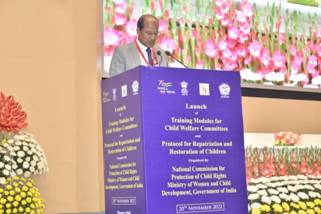
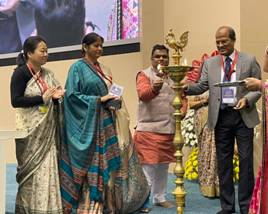
Speaking on the ocassion, Shri Indevar Pandey said that India needs standard protocols and uniformity in Juvenile Justice Rules for Child protection in the country. He also appreciated the work done by CWCs & DCPUs during COVID19 Pandemic. Talking about the Digital India program, Shri Pandey stated that NCPCR has come up with various online portals for the welfare of children. NCPCR has formulated the Training Modules for the Chairpersons and Members of the Child Welfare Committees that would help implementing the amendments brought in the Juvenile Justice Act. He also mentioned that under PM CARES for Children Scheme, around 4345 children were identified who had lost
both of their parents(s) during COVID pandemic. Support was provided to them under the PM CARE scheme. He exhorted that after every 3 months, the situation of these children should be monitored by the DCPOs and it is ensured that they are getting support for education and their rehabilitation. While speaking about the importance of training he emphasized that the training will bring uniformity in implementation of the protocols though out the country.
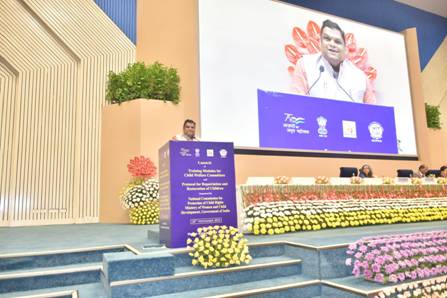
Chairperson, NCPCR in his inaugural address highlighted that all the Authorities, Stakeholders, Commissions & the Ministry of WCD present under one roof signify the commitment towards the protection of children of our country. He said, “ the theme for the World Child Rights Day is “Inclusion of Children” and children must be included in the education, brought into the main stream of society and given opportunity for their overall development”. Children constitute 40 per cent of our population but they are the 100 per cent in terms of making the future of our nation, he added. Shri Kanoongo further added that the GHAR portal and the protocols for repatriation and restoration being launched today will ensure the rights of children related to restoration and repatriation are realized. He said government has come up with various rules and regulations related to Child Rights which are beyond the provisions of UNCRC and we aim to carry this legacy further in the best interest of the children.
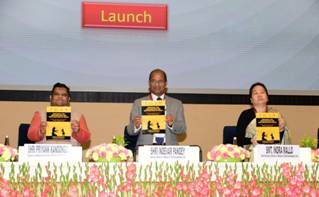
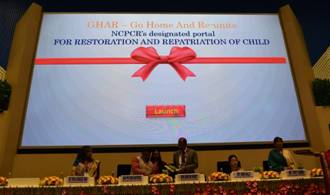
The launch event was followed by thematic technical sessions on (i) Orientation on Training Module for CWC and Protocols for Restoration and Repatriation of Children (ii) MASI Portal of NCPCR (iii) Baal Swaraj Portals of NCPCR. The proceedings of the day was concluded Question & Answers wherein various issues and doubts raised by the participants were clarified.
The conference was attended by 1200 participants including Chairpersons & Members from all the State Commissions for Protection of Child Rights (SCPCRs) from all the States/UTs, Chairpersons and Members of Child Welfare Committees (CWCs), Officials from District Child Protection Units (DCPUs) from all the districts. Officials of Ministry of Women and Child Development (WCD) and other dignitaries from Sardar Vallabhbhai Patel National Police Academy (SVPNP), CARA and NIPCCD were present on the occasion.
NCPCR is a statutory body constituted under Section 3 of the Commission for Protection of Child Rights (CPCR) Act, 2005 to protect the child rights and other related matters in the country. The Commission is mandated to monitor the proper and effective implementation of Juvenile Justice (Care and Protection of Children) Act, 2015 and its Rules; Protection of Children from Sexual Offences (POCSO) Act, 2012 and Right to Free and Compulsory Education (RTE) Act, 2009.
Background
(I) Training Module for Child Welfare Committees (CWCs) : The Training Module for Chairpersons and Members of Child Welfare Committees has been formulated with an aim to bring the roles and responsibilities of CWCs in one place comprehensively. Child Welfare Committees being the guardian of children who are vulnerable at the district level and the responsibilities placed on them for ensuring their care and protection is extensive. The Module is a 15 day programme for training of CWCs. It is divided into 63 sessions of over 72 hours duration. The participants would be required to spend an average of 4 hours 50 minutes in the training per day.
The key objective of the programme is to enhance the functional knowledge, improve relevant skills of the CWC members and the Chairperson-CWC, in order to deliver effective and timely service for protection and rehabilitation of children in need of care and protection, children in conflict with law, and to provide protection to the orphan, abandoned and surrendered children.
EXPECTED LEARNING OUTCOMES
The programme is intended to improve the personal, social, methodological and technical skills as required under the JJ Act 2015, JJ Rules 2016, subsequent amendments in Act and Rules, Mission Vatsalya and the Adoption Regulations. The programme should help the CWC members and the Chairperson-to be equipped with knowledge and skills and function as a competent authority to take important decisions in a timely manner and in the best interest of the child.
FACILITATOR
The facilitators or the resource persons should be subject experts who should be able to use role play and participative methods while taking sessions. They should have understanding about progressive legislations in the country for welfare of the children along with case laws (important Judgments of the Apex Court and the High Courts in recent years) and should be able to cite different case studies.
HIGHLIGHTS OF THE MODULE
- Based on interactive pedagogy including opportunities for discussions and activities.
- Principle of learning by doing is followed and field trips are included as a part of the learning experience where participants can visit the CCIs and involve in activities leading development of necessary skills and competencies.
- Module uses participatory methods such as case studies and discussion-based way of learning where participants resulting in gaining skills in critical thinking and team work.
- The topics have been arranged day-wise and in a sequential order as it is to be used.
- Material for handouts and activities and notes for facilitators have been provided along with the details of the day-wise session.
- At the beginning of each day key takeaways are highlighted followed by questions for assessment as a recap of the information of previous day training sessions.
STRUCTURE OF THE MODULE
The Module is a 15 days programme for training of CWCs. It is divided into 66 sessions of over 75 hours duration. The participants would be required to spend an average of around 5 hours in the training per day. Following information is given for each day/topic-
- Duration
- Objective(s)
- About the Session
- Pedagogy/Pedagogical Tools
- Resource Material for the Facilitator
- Procedure for activity (as applicable)
- Notes for the Facilitator
- Key takeaways
(II) Protocols for Restoration and Repatriation of Children : The Government of India brought landmark amendments to the Act and Rules and implemented the Juvenile Justice (Care and Protection of Children) Amendment Act, 2021, Juvenile Justice (Care and Protection of Children) Amendment Model Rules, 2022 and Adoption Regulations, 2022. One of such major amendments that have been brought about is in the process of repatriation and restoration of children. The new amendments have been made taking into consideration that restoration of a child in need of care and protection would be different from a child in conflict with law. It was seen that there were many children who were brought before the JJBs and the CWCs, who were prima facie seen to be belonging to some other place but were being difficult to be repatriated because the details of the native place were unable to be found out by the authorities. The challenges in repatriation of children to their native place were primarily observed to be the non-convergence between the authorities and lack of sharing of information between authorities within the system. The Protocol for repatriation and restoration is an endeavor being made to eliminate those challenges which are being faced by authorities in repatriation and send the maximum number of children back to their native place with their families/relatives.
CWCS WILL ENSURE AND TRACK DIGITALLY THE FOLLOWING:
1. Before transferring the child to another District/State, the CWC will ensure that all necessary documentations of the child have been completed.
2. The DCPU shall ensure that in cases of victim of offences, all documents/formalities are completed before transferring the child out of the District/State.
3. At step-2 of the GHAR portal, the CWC will be informing whether all necessary formalities and documentations have been done for the child who is to be repatriated.
4. CWC will transfer the case of the child to the concerned CWC and also digitally transfer the cases to the concerned CWC on the GHAR portal.
5. Where the whereabouts of the child are unknown, the CWC will transfer the investigation to local SJPU/Police/AHTU Station and update information on the portal.
6. Before transferring the child to another District/State, the CWC will ensure that the following steps have been taken.
i Case file is opened and basic information of the child is prepared.
ii. Note of proceedings, if any.
iii. Health Screening Report.
iv. Counselling report, if any.
v. Information to concerned CWC has been provided.
vi. Information to District Magistrate of the district where the child has been found has been provided.
vii. Escort order has been passed (Form 45)- In cases of female child, escort should be female.
viii. In case SIR and ICP was prepared, then copy of SIR and ICP to be uploaded.
ix. Status of bank accounts of the child.
x. Compensation, if any is provided.
xi. The child who is a victim of offences will be entitled to compensation amount, depending upon the nature of crime that has happened against the child.
xii. Both the DCPUs (DCPU of the transferring district and DCPU of the transferred district) shall ensure that the compensation amount is credited to the bank account of the child opened in the native place of the child under guidance of the respective District Magistrates.
xiii. However, it must be seen that the compensation amount can be credited into the bank account of the child even after repatriation. For purposes of compensation, the child should not be kept from being repatriated.
(III) GHAR - GO Home and Re-Unite (Portal for Restoration and Repatriation of Child : GHAR portal developed by NCPCR addresses the amended roles of CWCs and DCPOs in matters of children in need of care and protection.
FEATURES OF GHAR- GO HOME AND RE-UNITE (Designated portal of NCPCR):
i. Digital tracking and monitoring of children who are in the JJ system and have to be repatriated to another Country/State/District.
ii. Digital transfer of cases of children to the concerned JJB/CWC of the State. It will help in speedy repatriation of children.
iii. Where there is a requirement of a translator/interpreter/expert, request will be made to the concerned State Government.
iv. CWCs and DCPOs can ensure proper restoration and rehabilitation of children by digitally monitoring the progress of the case of the child.
v. A checklist format will be provided in the forms so that the children who are being hard to repatriate or children who are not getting their entitled compensation or other monetary benefits can be identified.
vi. List of Government implemented schemes will be provided, so that at the time of restoration the CWCs can link the child with the schemes to strengthen the family and ensure that child remains with his/her family.
******
SS/TFK
(Release ID: 1877543)
Visitor Counter : 2999